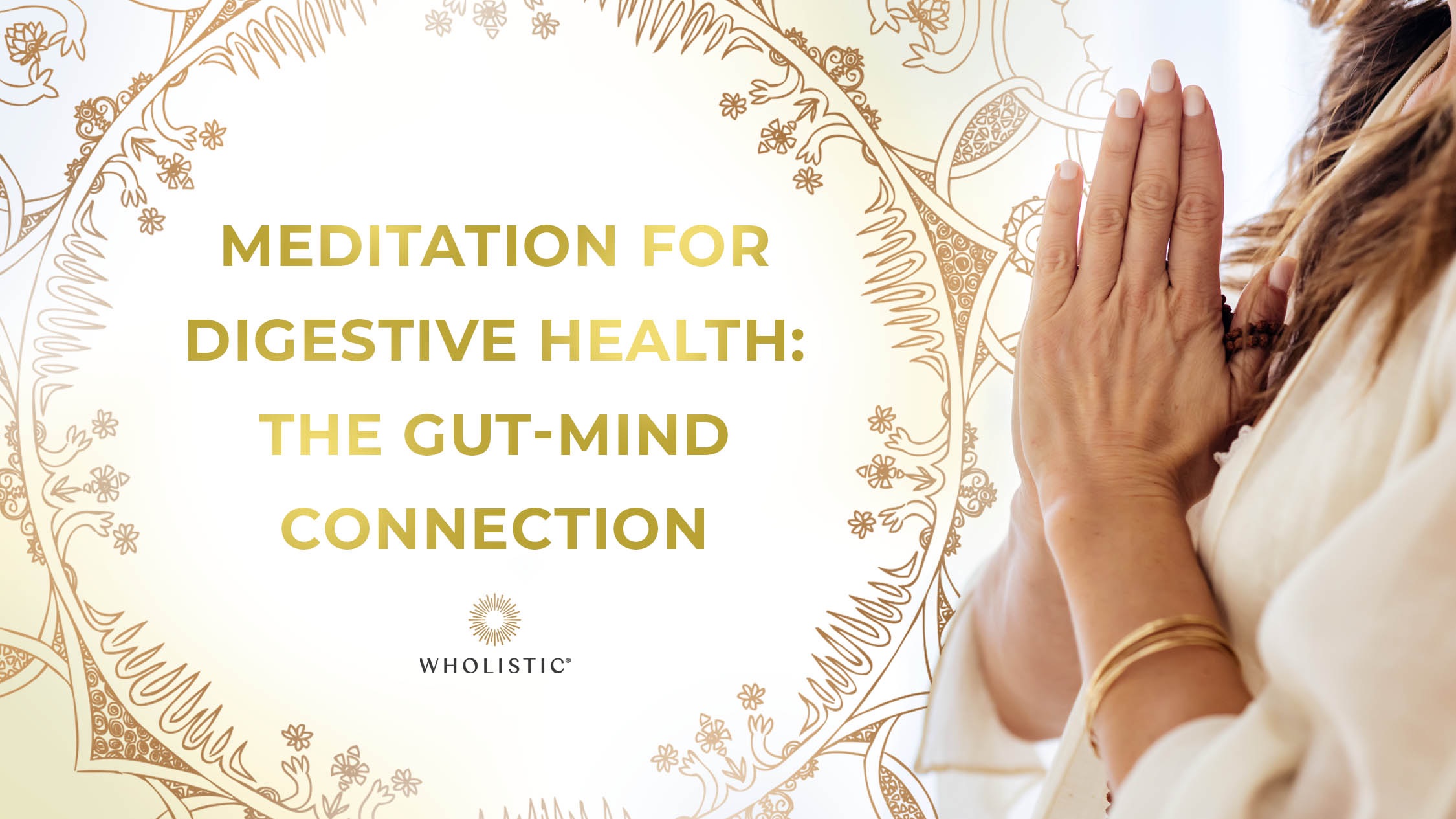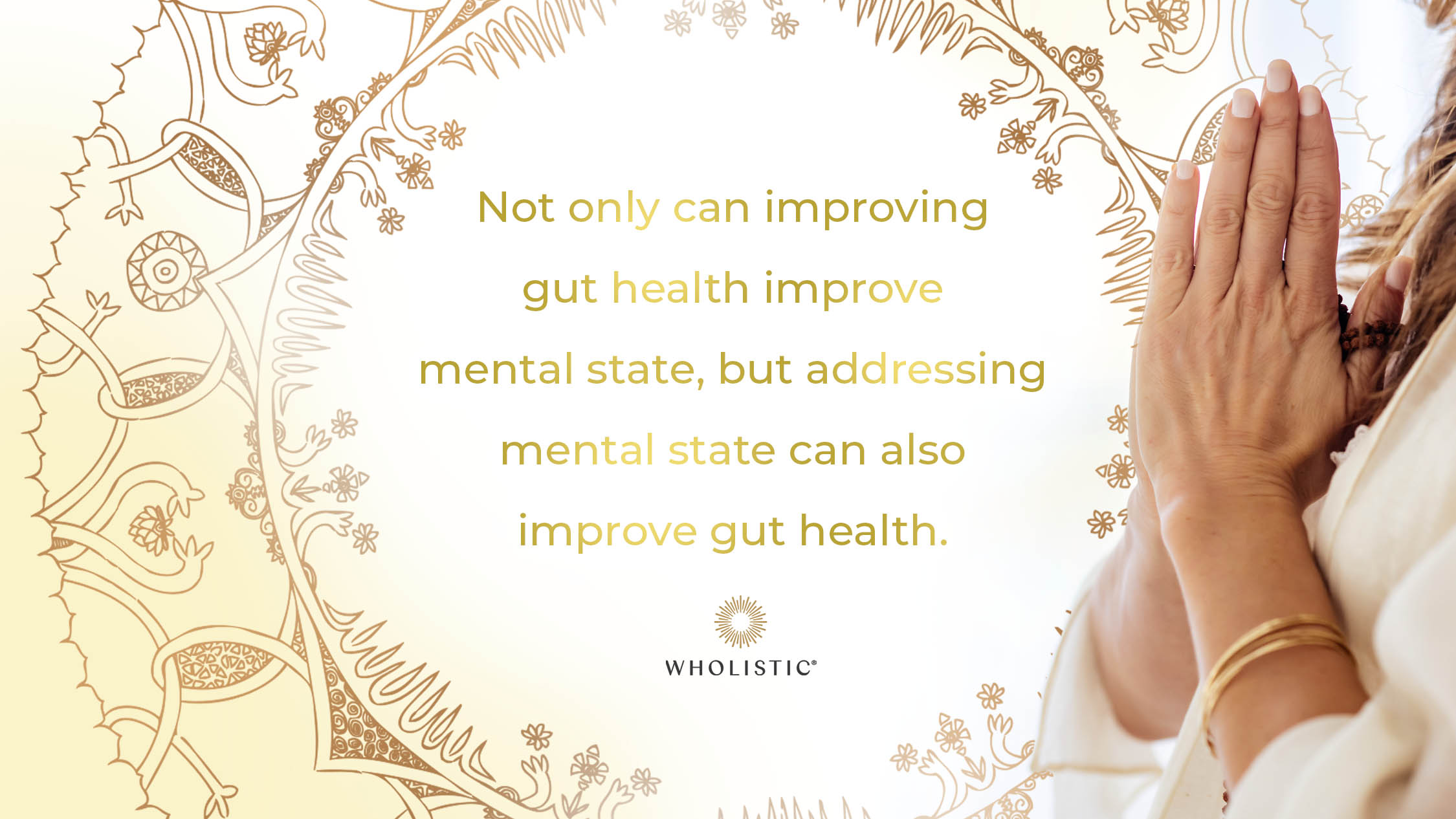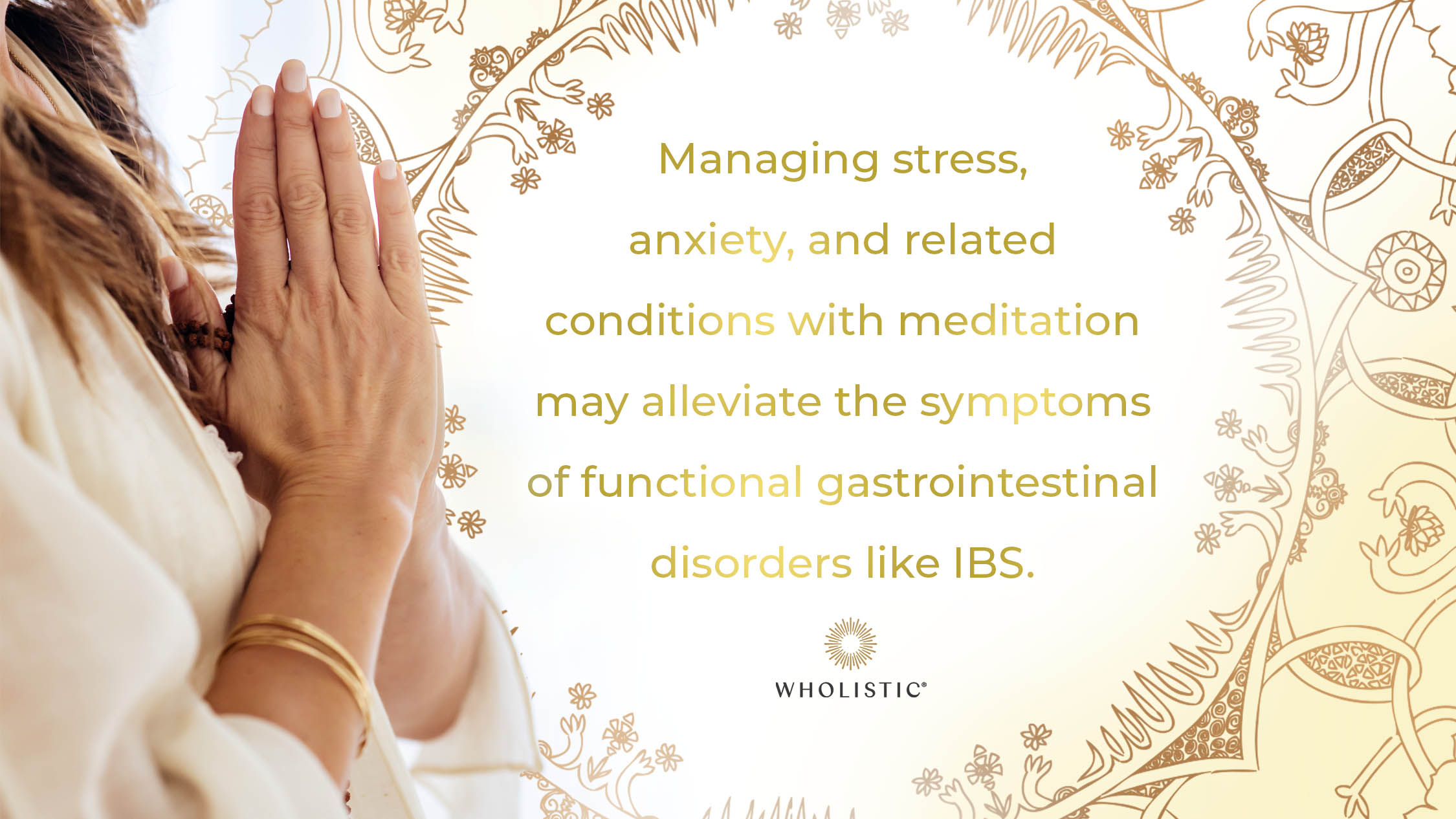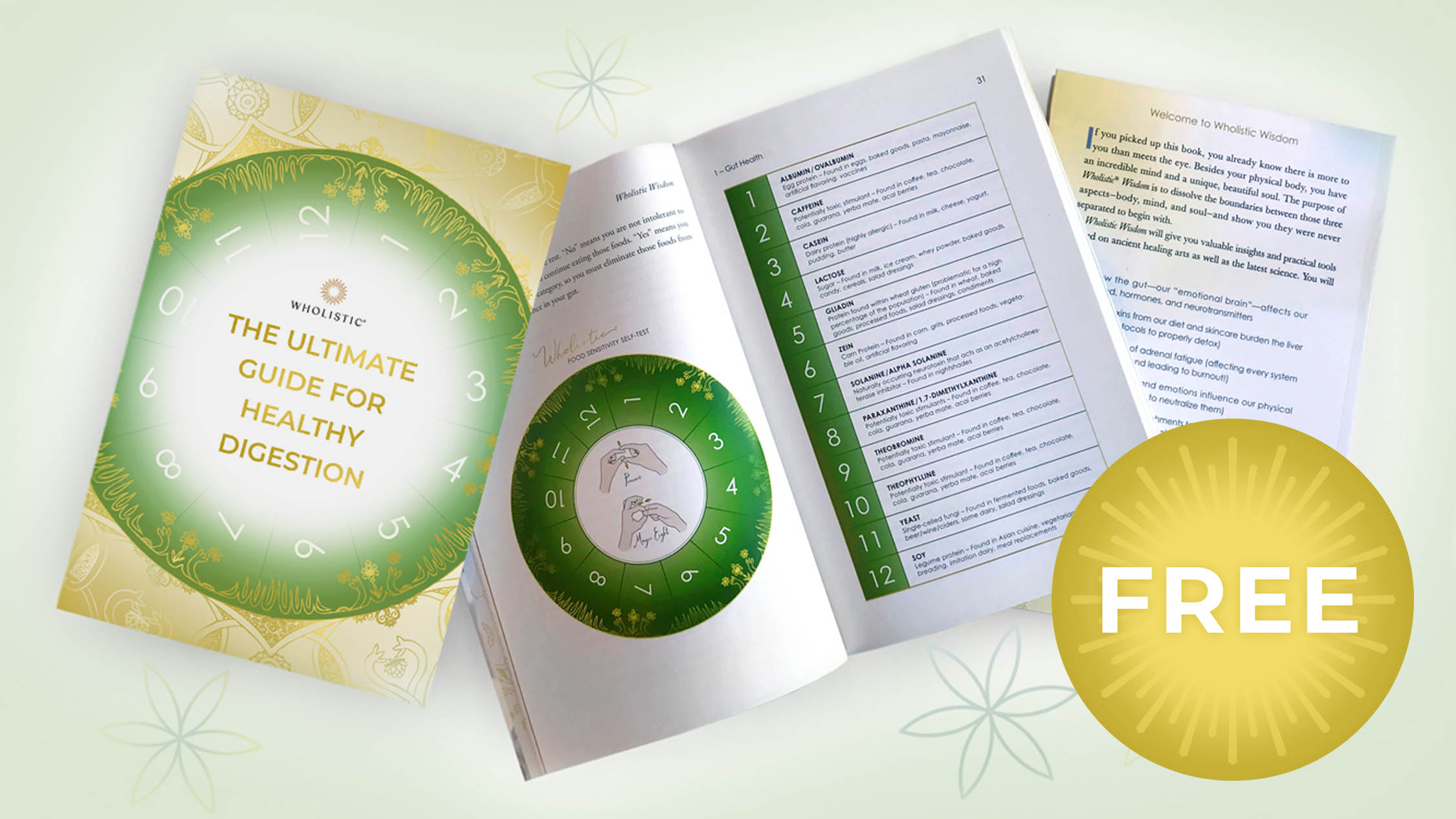Meditation for Digestive Health: The Gut-Mind Connection

Increasing evidence suggests that gut health may be the key to a happy life!
When your gut is in balance, it sets the stage for a happy mind. More and more people are experiencing this phenomenon for themselves and prioritizing gut health. That’s why probiotic supplements have become a multi-billion dollar industry and #guttock is trending. (1)
It's easy to fall into the trap of believing that a daily probiotic supplement is the ultimate solution to gut health. The truth is, there’s no such thing as a quick fix for gut imbalances. Your entire lifestyle must be considered to sustain long-term digestive health.
We always hear about how gut health affects mental health but what if addressing the mind could help balance the gut?
There’s emerging evidence that meditation can help promote optimal digestive health!
In this blog, I’m sharing highlights from some groundbreaking studies that explore the exciting connection between meditation and gut health. You’ll also learn my top 5 tips for establishing a consistent meditation practice. Don’t miss my list of Wholistic resources for improving your gut health!
Intro to the Gut-Mind Connection
Before we dive into the research, here’s some quick background on the gut-mind connection. The gut microbiome is the community of bacteria that live in your digestive tract. The health and balance of these bacteria are crucial for your overall health, including your mood and behavior.
The gut-brain axis is a two-way communication pathway between the brain and the gut. This pathway allows the gut to send signals to the brain, and vice versa. The gut microbiome plays a key role in this communication pathway.
For example, some studies have shown that people with depression have different gut microbiomes than people who are not depressed. These studies suggest that the gut microbiome may play a role in the development and progression of depression.
The gut-brain axis also plays an important part in regulating the immune system, hormonal signaling, and stress response. When the gut microbiome is out of balance, it can lead to inflammation, which can have negative effects on mood and behavior.
There is still much that we don't know about the gut microbiome and its impact on mood and behavior. However, the research available suggests that there is a strong connection between the two.
Let's explore some studies that show that the gut-brain connection is a two-way street. Not only can improving gut health improve mental state, but addressing mental state can also improve gut health.

Deep Meditation Significantly Improves Gut Health
This recent study showed that regular deep meditation, practiced over several years, may have a positive impact on the gut microbiome and potentially reduce the risks of physical and mental health issues. (2) The study showed that the gut microbiomes of Tibetan Buddhist monks differed significantly from those of control subjects and were associated with a lower risk of anxiety, depression, and cardiovascular disease.
The study analyzed stool and blood samples from 37 Tibetan Buddhist monks and 19 people living nearby outside of the monastery. The monks, who had been practicing deep meditation for at least 2 hours a day for 3 to 30 years, showed significant differences in the diversity and volume of gut microbes compared to their neighbors.
Prevotella, Bacteroidetes, Megamonas, and Faecalibacterium species were enriched in the monks' gut microbiomes. These bacteria are associated with alleviating mental illness. Advanced analysis indicated that the microbes in the meditation group influenced several protective anti-inflammatory pathways and metabolic processes that support overall health.
Relaxing the Mind Alleviates G.I. Distress
Functional gastrointestinal disorders like irritable bowel syndrome (IBS) affect 60 to 70 million people worldwide and are becoming increasingly more common. Stress, anxiety, and mental disorders can make these gut issues worse. But here's the good news: mind-body interventions like meditation can help! Managing stress, anxiety, and related conditions with meditation may alleviate the symptoms of functional gastrointestinal disorders like IBS. (3)

Mindfulness Practice Revitalizes Gut Bacteria Associated with Cognitive Decline
A thrilling discovery has come to light linking the gut-brain connection to cognitive decline. In this randomized-control trial, researchers observed the effects of mindful awareness practice among elderly individuals diagnosed with mild cognitive impairment. As participants engaged in this mindfulness practice, their cognitive impairment showed notable improvement and their gut bacterial profiles underwent significant transformations.
This landmark study is the first to demonstrate a profound link between cognitive capacity and corresponding changes in the gut microbiome. These findings strongly suggest that signals from different areas of the brain may directly or indirectly influence the abundance of specific gut microbes. As we unravel this intricate gut-brain connection, it opens up a world of possibilities for improving cognitive function. (4)
Top 5 Tips for Establishing an Enriching Meditation Practice
1. Start small and simple. Keep it simple and sustainable if you’re just starting your journey with meditation. Even 5 or 10 minutes a day can make a big difference. Check out meditation apps and find one that resonates with you and your style of learning. Once you learn the basics of meditation, it is much easier to stay motivated to continue your journey.
2. Stick to a schedule. Meditation is most effective when you do it regularly. Try to meditate at the same time each day, even if it's just for a few minutes. This will help you to create a habit and give you a better chance of maintaining a consistent practice. Remember, the days you feel the least motivated to meditate are often the MOST transformative!
3. Try different styles of meditation. There are many different ways to meditate! If mindfulness meditation is not your cup of tea, try a guided meditation. Using a mantra or visualization helps to focus your mind and keeps you from getting distracted. I offer many guided meditations on my Youtube channel created especially to help you relax and focus. Access the FREE guided meditation playlist here! And, get started with my Wholistic Divine Oneness Meditation below...
4. Stimulate the vagus nerve. The vagus nerve is the longest nerve in the body. It starts in the brainstem and travels down the neck, chest, and abdomen. Along the way, it branches out to innervate many different organs, including the heart, lungs, and gut. Every time you meditate and spend time focusing on your breath, you stimulate the vagus nerve and release stress. Chanting “OM” creates sound waves that travel through the body. Adding this chant to your meditation is a particularly powerful way to activate the vagus nerve.
5. Be patient and kind to yourself. If you feel like you don’t have time to meditate - that’s when it can be especially helpful. Meditation takes practice. Stick to it even if you don't see results immediately. Just keep practicing and be patient with yourself. The more you meditate, the easier it will become.
If you follow these tips, you'll be well on your way to establishing a fulfilling meditation practice that can boost your overall health and wellbeing. And remember, by taking action to support BOTH the mind and the gut, you're doubling the opportunities to improve your health!
Wholistic Resources for Boosting Gut Health
If you're ready to take control of your gut health, I'm here to help! I consider gut health one of the top contributors to body, mind, and soul balance. Here are 5 resources you can get started with right now to boost your gut health:
1. Book Your Quantum Health Session (1:1 service with my professional guidance)
2. The Ultimate Guide For Healthy Digestion (FREE PDF download)
3. The Top 3 Health Benefits of Kimchi (my latest culinary obsession!)
4. My Recommended Probiotic Supplement (use code WQH11 for 10% off your purchase!)
5. Bifidobacteria and the Survival of Species with Sabine Hazan (an illuminating interview with a top gastroenterologist)
References
1. “Probiotics Dietary Supplements Global Market Report 2023.” ReportLinker. Accessed June 15, 2023. https://www.reportlinker.com/p06310161/Probiotics-Dietary-Supplements-Global-Market-Report.html.
2. Sun, Ying, Peijun Ju, Ting Xue, Usman Ali, Donghong Cui, and Jinghong Chen. “Alteration of Faecal Microbiota Balance Related to Long-Term Deep Meditation.” General Psychiatry, January 1, 2023. https://gpsych.bmj.com/content/36/1/e100893.
3. Kanchibhotla, Divya, Peeyush Sharma, and Saumya Subramanian. “Improvement in Gastrointestinal Quality of Life Index (GIQLI) Following Meditation: An Open-Trial Pilot Study in India.” Journal of Ayurveda and Integrative Medicine, February 11, 2021. https://www.sciencedirect.com/science/article/pii/S0975947621000085.
4. Khine, Wei Wei Thwe, Miao Lian Voong, Ted Kheng Siang Ng, Lei Feng, Grishma Avinash Rane, Alan Prem Kumar, Ee Heok Kua, Ratha Mahendran, Rathi Mahendran, and Yuan-Kun Lee. “Mental Awareness Improved Mild Cognitive Impairment and Modulated Gut Microbiome.” Aging, December 9, 2020. https://www.ncbi.nlm.nih.gov/pmc/articles/PMC7762482/.
Discover Three Powerful Ways to Bring Health & Vitality Into Your Everyday Life in This FREE Masterclass by Worldwide Master Practitioner In Wholistic Healing, Elena Bensonoff.
Sign Up for the Masterclass below:






